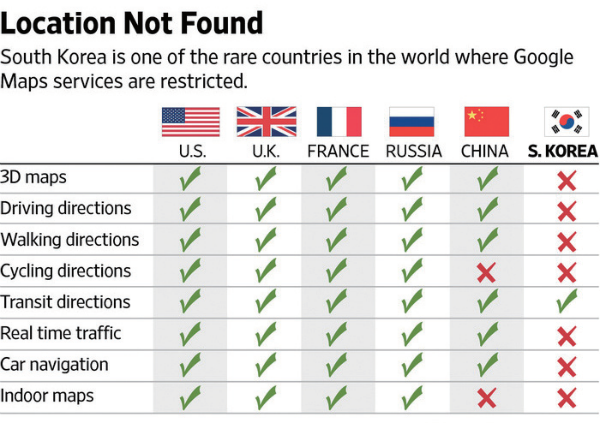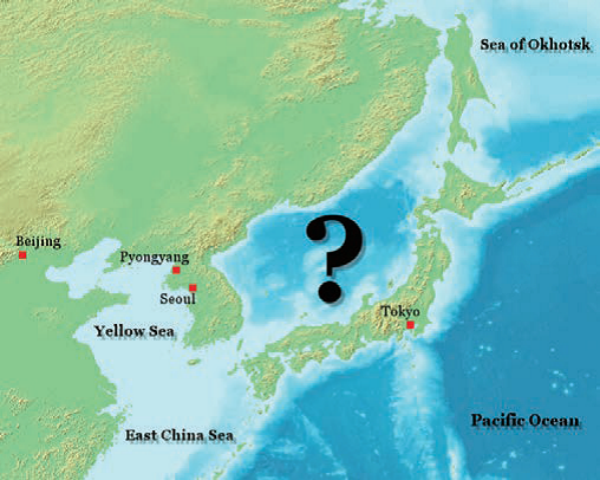On August 24, the Korean government was to decide whether to allow Google to take the Korean map data out of the country. The government, however, put off the decision until November 23. As Information Technology (IT) mainly depends on the map data, not only Google, but various global corporations are expected to challenge the Korean government over similar issues in the future. The Sungkyun Times (SKT) introduces the importance of map data, the present conditions and existing issues surrounding the request by Google, and what needs to be done to resolve the issue.
The Importance of Digital Map and Google’s Request
The Importance of Digital Map
Digital mapping is the process of amassing data from traditional paper maps and formatting it into a virtual image for computer usage. The Korean digital map has a long history. Over the past 25 years, the government has invested approximately one trillion won to produce an accurate map with a scale of 1:5,000. Considering that there are only ten other countries with such precise maps, it is extremely valuable. A digital map plays a key role in location-based services (LBS), which use location data for drones, self-driving cars, car sharing services, and smart traffic control systems. LBS is essential in the fourth industrial revolution, a rising industry based on IT that includes virtual reality. In order to activate LBS, it is crucial to build a map database. Meanwhile, according to “Palo Alto Networks,” a data center is a facility that centralizes an organization’s IT operations and equipment and stores, manages, and disseminates its data. Global corporations export map data out of countries and store the information in data centers worldwide. Google, for example, has 15 centers in eight nations including the United States (US), Taiwan, and Chile, and provides map services through these centers.
Google’s Request for the Korean Map Data
Google has requested for the use of the Korean digital map data abroad for several reasons. Firstly, the quality of the Korean Geographic Information System (GIS) data is exceptional. GIS is a system designed to store, manipulate, analyze, and present geographical data. Data entering into GIS include information of the location of roads, and as more landmarks are involved in the system, the map becomes more precise. Secondly, Korea is an optimal test bed for the technologies and services of new industries such as drones and car sharing, because of the well-established IT infrastructures and the population density. Thirdly, Korea has an active smartphone application market. The annual sales on average reach around three trillion won and has the third largest market in the world after the US and Japan. Considering that LBS is based on applications, Google would be able to gain more profits with the map data, through advertisements in map services for instance. In 2007, Google requested the Korean government to allow it to carry the detailed map data out of the country for the first time, but the government rejected for security purposes. In 2014, the government deregulated the domestic law concerning the map services. Consequently, unlike the past when export was unconditionally illegal, corporations can now export the map data if they obtained government approval. The Ministry of National Defense, the Ministry of Foreign Affairs, and other government departments participate in joint meetings to reach thorough rulings.
Google made its second appeal in June this year. In the beginning, only companies paid attention to the case. In July, however, the Pokemon GO (a location-based augmented reality game) craze aroused the attention of the Korean public. There was a widespread rumor that it would be difficult to fully enjoy the game because of the limitations of Google’s map services. The rumor is actually half true. It is true in that it is troublesome to locate targets when playing the game since the map is not shown. On the other hand, it is false because the game runs independently of Google’s map data. As an example, people can fully enjoy the game Ingress, which is a different VR game.

The government planned to reach a resolution on Google’s request by August 24. The government claimed that Google could obtain permission to export the map data as long as Google wipes out the nation’s military facilities from the digital map, which Google refused. The two parties could not bridge their differences and failed to reach an agreement. The decision has been postponed and the consideration period before the final ruling has been extended another 60 days until November 23. If a conclusion is not reached by then, there would be an extra 60-day extension.
The Main Issues
There are several issues surrounding the export of the Korean map data.
Security On the pro side of the export, many argue that it would not threaten national security. The data that Google is trying to carry outside of the country would be purchased from SK Telecom, a South Korean wireless telecommunications operator, meaning that it does not contain any security facilities. On the con side, however, many contend that the export would increase security threats. Google is requesting for the map data, which is a point of interest (POI). A POI is a specific point of location that someone may find useful, such as the name of a road or a building. It is imperative not to confuse the map data with “the image information,” which includes pictures and satellite photographs. People against the export are concerned about the possibility of the exposure of priority facilities once the exported data and satellite photograph are synthesized. This exposure could aid enemies in increasing their target accuracy, and might especially increase the vulnerability to attacks from countries like North Korea.
Industry Those who advocate the export argue that Korean laws hamper innovation in the country. Google is currently providing state- of-the-art functions worldwide, such as 3D maps, driving directions, walking directions, and car navigation, but transit direction is the only service offered in Korea. The government- supplied map data is essential for Google to offer complete mapping services. People claim that if the data is not available overseas, Korea would not be able to enjoy the high quality and diverse functions like other countries, and thus fall behind in the industry. The opponents contend that Korean IT corporations, such as Naver and Kakao, are already providing services like navigation. Although the quality and functions are not as great, there is no big difference in mapping services. Moreover, they claim that the domestic IT industry would regress as Google might take over the Korean map industry. Map data is the basic asset of location-based apps and software, and Google is presently ahead of Korean IT corporations in such areas. In addition, Google Maps is automatically installed in Android-based smartphones, so there is no need for users to personally download it. As a consequence, the dependence on Google’s map data would increase, which might lead to a direct hit on domestic companies managing map information.

Tax There was an opinion claiming that Google is trying to export the map data in order to avoid tax, as it is attempting to export the data even though it could simply store it in a Korean server or data center after establishing one in Korea.
On the pro side of the export, people argue that the establishment of a Korean data center and the tax issue are not related, claiming that Google is trying to store the Korean data in centers that already exist in many different places worldwide. Critics instead speculate that Google has been taking advantage of a legal loophole to avoid taxes by not establishing a data center in Korea. A data center is the basis of tax imposition, which is why Google set them up in tax havens like Singapore and stored the data there. As a result, Google is barely paying corporate tax to Korea even though it is gaining at least one million won in the market.
Other Issues Some claim that the export of the map data would vitalize the tourism business. Google Maps only offers location searches and transit directions, and Korean corporations are not producing English maps. Accordingly, foreign tourists are experiencing significant discomfort. If Google were able to provide full services, such annoyance among travelers would disappear, leading to the activation of the tourism business. In addition, in order to prepare for international events hosted in Korea, such as the 2018 Winter Olympics, the discomfort must be resolved. On the other hand, those who are against the export pose the issue of the terminology of certain places. Google uses the term “Dokdo” and the “East Sea” in the map displayed on the Korean version of the site. In the English and Japanese sites, however, the term “Sea of Japan” is used instead of the “East Sea” and “Liancourt Rocks” and “Takeshima” respectively, in place of “Dokdo.” Some suspect that Google does not want to offend Japan, one of its biggest customers. If the map data is exported while the terms are continuously used without any corrections, more foreigners might misunderstand certain names of location.

What Needs to Be Done
There are various methods the Korean government could choose in different conditions. Currently there is no existing law that restricts the usage of the collected data by Google. It is difficult to trace the management of domestic users’ information. Moreover, there are no means yet to rectify the errors that could occur after the export. If Google’s request is accepted in the future, it is desirable for the government to arrange an ex-post regulation. If Google’s request is rejected, it would instead be desirable for Korea to voluntarily establish a technology ecosystem similar to that of Google and create a powerful and independent IT industry in the long run. For example, Uber, an online transportation network company, declared its independence from Google Maps on July 31. The primary reason was that the usage fee of the map was a barrier to the expansion of the business. Uber invested $500 million this year to produce its own map. Likewise, China has prevented Google from offering services since 2010. If foreign corporations want to provide LBS in China, they must cooperate with Chinese companies. Overall, it is necessary to seek for the coherence between government departments. The ministries currently have disparate opinions. For example, the Ministry of Land, Infrastructure, and Transport is against the export, while the Ministry of Foreign Affairs and the Ministry of Commerce Industry and Energy are supporting Google’s request. Accordingly, the government does not have a high profile on the issue, which is one of the major reasons for constant postponements. The postponement raised more controversies and the United States Trade Representative (USTR) has begun getting involved in the affairs. Therefore, it is desirable for the government to resolve the difference of opinions among the ministries and maintain unity.
Although the Pokemon GO craze is abating, the controversy over Google’s request for Korean map data is unlikely to fade. More and more issues are arising and the USTR has recently begun to interfere. In these conditions, the Korean government should handle the request with more consideration. “More consideration,” however, does not just mean more postponements. The government must first seek coherence between government departments and reach the best conclusion by November 23.
